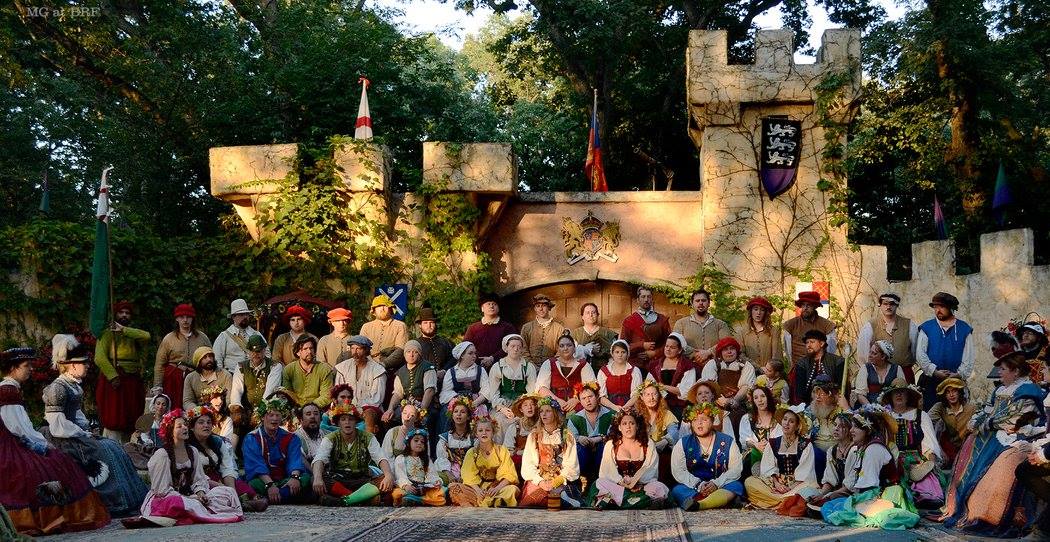There are but 25 days for us at Bristol each season if we count only rehearsal days, run days, and strike. Three-and-a-half weeks. Plus a little more for the first-years; call it just over four for them.
Oh yes: we have more we do together, but the majority of time is at Bristol. And that is where our Bande becomes brothers. And sisters. And an uncle. A family is forged in the experience, with a bond paid in laughter, sweat….and tears when the Bristol run is over.
When Shakespeare wrote the St. Crispin’s Day speech in Henry V, he tapped into fundamental truths of those in battle: both a shared adversity and common struggle brings people together and fosters in them friendship and kinship nigh unbreakable. They trust that each person will perform his or her duty lest all die. Now while we certainly face neither slings nor arrows, bombs nor bullets, we do face our own set of challenges: Marching. Pike drills. Firing a musket. Being part of a show. Understanding who we are and who we can be. Learning skills outside our comfort zones. Trusting relative strangers (in some cases) to be the net when we leap.
I spoke with my boss (a twenty-year veteran of the US Navy) about this. He told me that it begins and ends with the trust. That no one needs to know what you do; just that you do exactly as you are supposed to–especially at sea, where there’s no easy escape if something does go horribly wrong. You trust because you have no other option. When the bullets fly, when the torpedoes launch, when the aircraft sortie: each person’s life is in everyone else’s hands. Those who cannot rise to the challenge will drag others down–and no one wants to trust that person. They would prefer “crowns for convoy be put in his purse” and he be sent off where he can’t do harm to them.
Again, we don’t face anything so harrowing or extreme. Unless, of course, you count high humidity, drunken patrons, or–and I shudder to think of this–the possibility of the cheese fritters being sold out. That last would drive most to despair. Nevertheless, we do have from time to time those who, for one reason or another, just aren’t a good fit. While the consequences of that aren’t as…final, it still must be dealt with in a similar manner for the sake of the family–for the sake of trust. As an aside, I contemplated not writing this part; I didn’t want to introduce negativity. But that’s just not life, is it. After all: Shakespeare did touch upon it, as Henry and his army “would not die in that man’s company that fears his fellowship to die with us.” (Seriously, Will: “that man’s company that”? Did it not occur that “who” would be much better while keeping the meter correct?)
But that’s a very tiny number compared to those who persevere and embrace the kinship. Oh, some no longer participate as much–if at all–for any number of reasons. As John Lennon so aptly put it: life is what happens to you while you’re busy making other plans. Many still come back at least once every year though, on the vigil as it were. We gather in good company, sharing stories and singing songs, dining and drinking, revisiting friendships old, making new, and remembering who we’ve lost through the years. Those who return from absence find it easy to slip back into familiar character, knowing that each of us will be there for support. We have all shed sweat (and sometimes blood) with each other, and our names are remembered–even if we were graced with someone’s presence only for a short time.
What is it then which keeps us coming back, whether for a day, the whole run at Bristol, the whole year ‘round, or anything in-between? What keeps us together? What binds us? Is it being able to do something we love? Is it the opportunity to learn something new all the time? Is it the chance to make a difference not only for the patrons but each other as well? Is it that we find in each other something we all like? Is it that we are made better for having known each other? Is it the bad puns? Is it the cheese fritters? The answer is: yes (especially the cheese fritters).
We’ve created friendships based on trusting that each of us will be the net for the others. I have your back; you have mine. Just as it is for those in today’s militaries. Just as it was at Agincourt (however fictionalized it was via Shakespeare). And just as with the real military, our bonds do run deep. We are there for each other whenever we can be. Therein lies our strength: our commitment to each other.
When the day comes at the end of the run where we drink a health to the company from the parting glass–when our deeds are still freshly remembered–we each reflect upon what we did. Upon all how much we’ve grown, both as a person and grown attached to each other. Consider then the St. Crispin’s Day speech, and how it describes the loyalty, honor, and kinship-neé-friendship born out of those who give of themselves in creating a whole better than its parts. It describes us.
We happy few. We Bande of brothers. And sisters. And an uncle.
Don Kresch



